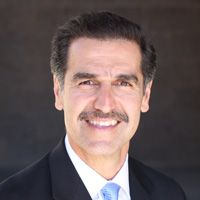Wealth Management vs. Financial Advice: They’re Not the Same
Taxes, estate planning, charitable giving: Your financial life is complicated. A wealth management team will help you with much more than just your money.


Profit and prosper with the best of Kiplinger's advice on investing, taxes, retirement, personal finance and much more. Delivered daily. Enter your email in the box and click Sign Me Up.
You are now subscribed
Your newsletter sign-up was successful
Want to add more newsletters?

Delivered daily
Kiplinger Today
Profit and prosper with the best of Kiplinger's advice on investing, taxes, retirement, personal finance and much more delivered daily. Smart money moves start here.

Sent five days a week
Kiplinger A Step Ahead
Get practical help to make better financial decisions in your everyday life, from spending to savings on top deals.

Delivered daily
Kiplinger Closing Bell
Get today's biggest financial and investing headlines delivered to your inbox every day the U.S. stock market is open.

Sent twice a week
Kiplinger Adviser Intel
Financial pros across the country share best practices and fresh tactics to preserve and grow your wealth.

Delivered weekly
Kiplinger Tax Tips
Trim your federal and state tax bills with practical tax-planning and tax-cutting strategies.

Sent twice a week
Kiplinger Retirement Tips
Your twice-a-week guide to planning and enjoying a financially secure and richly rewarding retirement

Sent bimonthly.
Kiplinger Adviser Angle
Insights for advisers, wealth managers and other financial professionals.

Sent twice a week
Kiplinger Investing Weekly
Your twice-a-week roundup of promising stocks, funds, companies and industries you should consider, ones you should avoid, and why.

Sent weekly for six weeks
Kiplinger Invest for Retirement
Your step-by-step six-part series on how to invest for retirement, from devising a successful strategy to exactly which investments to choose.
These days, there are so many terms used to describe what financial professionals do – advising, coaching, consulting, planning, guiding, managing, etc. – none of them seems to hold much meaning, for investors or those in the industry.
And that’s a shame. Because there is a difference.
Wealth management is one of the terms that is most overused, and it’s often misunderstood. But it’s actually pretty straightforward. Wealth management takes things up a notch, with an adviser or advisory team providing a full range of services for the client in three distinct ways.
From just $107.88 $24.99 for Kiplinger Personal Finance
Become a smarter, better informed investor. Subscribe from just $107.88 $24.99, plus get up to 4 Special Issues

Sign up for Kiplinger’s Free Newsletters
Profit and prosper with the best of expert advice on investing, taxes, retirement, personal finance and more - straight to your e-mail.
Profit and prosper with the best of expert advice - straight to your e-mail.
1. Investment consulting
You probably see ads and hear pitches every day from individuals and companies who want to sell you investment products. Some do it better than others. Although any licensed adviser can help you on this platform, a good wealth management team can provide a wide variety of options to choose from.
2. Advanced planning
This is where a wealth manager really differentiates himself. Few advisers do this type of planning, which includes:
- Wealth enhancement: This is the use of strategies to deal with cash-flow issues and liquidity concerns, mitigate taxes and maximize growth.
- Wealth transfer: Advisers look for the most efficient ways to pass your wealth on to your heirs in a way that lets your beneficiaries keep most or all of the money.
- Wealth protection: For those who are subject to a lot of liabilities, there are strategies that can help protect hard-earned savings and avoid any blind spots.
- Charitable giving: With proper planning, donating to a charity or charities can be a win-win, maximizing support for a favorite cause while making the most of certain tax advantages.
3. Relationship management
This is about building a trusting partnership that goes beyond the basics, thoughtfully connecting with clients and their needs in two ways:
- The client relationship: Through a careful discovery and review process, the adviser can see where clients are now and where they want to go, and look for any gaps that might exist.
- A professional network relationship: A top-notch advisory firm will build a team around each client to help with all kinds of issues. It could include a CPA, an estate-planning attorney, a property and casualty expert, a long-term care consultant or some other professional. And, if the client already has some of these experts in place, the team will communicate and work with them to further enhance their efforts.
A wealth manager’s No. 1 aim is to find out what’s important to you and provide financial solutions. If you’re looking for a full-service, collaborative approach to reaching your financial goals – now and in retirement – an adviser who practices true wealth management could be just the right fit for you. I typically suggest talking with your friends and family and get a referral that way. When you sit down at your first meeting, ask questions.
- What does their typical client look like?
- What net worth are they used to working with?
Wealth managers should be able to help with tax-reducing strategies, preparing an income plan, maximizing Social Security and making sure estate-planning documents are in order.
Securities offered through GF Investment Services, LLC. Member FINRA/SIPC. Investment Advisory Services offered through Global Financial Private Capital, LLC. California Insurance License #s 0B34918
Kim Franke-Folstad contributed to this article.
Profit and prosper with the best of Kiplinger's advice on investing, taxes, retirement, personal finance and much more. Delivered daily. Enter your email in the box and click Sign Me Up.

David Kanani is the president of Kanani Advisory Group. He has passed his Series 7 and Series 65 securities exams, and is also licensed to sell life insurance and annuity products. He holds a bachelor’s degree in business administration from the University of Louisville.
-
 Dow Leads in Mixed Session on Amgen Earnings: Stock Market Today
Dow Leads in Mixed Session on Amgen Earnings: Stock Market TodayThe rest of Wall Street struggled as Advanced Micro Devices earnings caused a chip-stock sell-off.
-
 How to Watch the 2026 Winter Olympics Without Overpaying
How to Watch the 2026 Winter Olympics Without OverpayingHere’s how to stream the 2026 Winter Olympics live, including low-cost viewing options, Peacock access and ways to catch your favorite athletes and events from anywhere.
-
 Here’s How to Stream the Super Bowl for Less
Here’s How to Stream the Super Bowl for LessWe'll show you the least expensive ways to stream football's biggest event.
-
 How to Add a Pet Trust to Your Estate Plan: Don't Leave Your Best Friend to Chance
How to Add a Pet Trust to Your Estate Plan: Don't Leave Your Best Friend to ChanceAdding a pet trust to your estate plan can ensure your pets are properly looked after when you're no longer able to care for them. This is how to go about it.
-
 Want to Avoid Leaving Chaos in Your Wake? Don't Leave Behind an Outdated Estate Plan
Want to Avoid Leaving Chaos in Your Wake? Don't Leave Behind an Outdated Estate PlanAn outdated or incomplete estate plan could cause confusion for those handling your affairs at a difficult time. This guide highlights what to update and when.
-
 I'm a Financial Adviser: This Is Why I Became an Advocate for Fee-Only Financial Advice
I'm a Financial Adviser: This Is Why I Became an Advocate for Fee-Only Financial AdviceCan financial advisers who earn commissions on product sales give clients the best advice? For one professional, changing track was the clear choice.
-
 I Met With 100-Plus Advisers to Develop This Road Map for Adopting AI
I Met With 100-Plus Advisers to Develop This Road Map for Adopting AIFor financial advisers eager to embrace AI but unsure where to start, this road map will help you integrate the right tools and safeguards into your work.
-
 The Referral Revolution: How to Grow Your Business With Trust
The Referral Revolution: How to Grow Your Business With TrustYou can attract ideal clients by focusing on value and leveraging your current relationships to create a referral-based practice.
-
 This Is How You Can Land a Job You'll Love
This Is How You Can Land a Job You'll Love"Work How You Are Wired" leads job seekers on a journey of self-discovery that could help them snag the job of their dreams.
-
 65 or Older? Cut Your Tax Bill Before the Clock Runs Out
65 or Older? Cut Your Tax Bill Before the Clock Runs OutThanks to the OBBBA, you may be able to trim your tax bill by as much as $14,000. But you'll need to act soon, as not all of the provisions are permanent.
-
 The Key to a Successful Transition When Selling Your Business: Start the Process Sooner Than You Think You Need To
The Key to a Successful Transition When Selling Your Business: Start the Process Sooner Than You Think You Need ToWay before selling your business, you can align tax strategy, estate planning, family priorities and investment decisions to create flexibility.